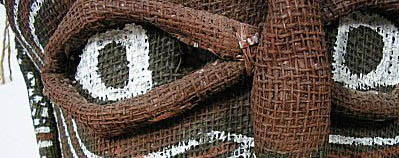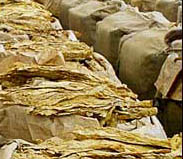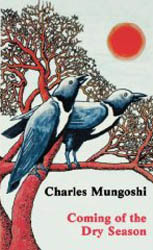Theatre of Dreams
 A short stout man stood surveying his fields, a satisfied look on his face. His tobacco crop was marvellous, the best he had produced in all his farming years. And the maize was also looking good, with most plants having two cobs. These green fields reminded him of his childhood days, when the communal land in his native Zvimba had been strong and fertile and could still produce good yields. Now it was sucked of nutrients and bleached sandy white.
A short stout man stood surveying his fields, a satisfied look on his face. His tobacco crop was marvellous, the best he had produced in all his farming years. And the maize was also looking good, with most plants having two cobs. These green fields reminded him of his childhood days, when the communal land in his native Zvimba had been strong and fertile and could still produce good yields. Now it was sucked of nutrients and bleached sandy white.
But that life was in the past.
As one of the people resettled by the government on Cockington Estates, Josefa Muroti had become the proud part-owner of a proper farm. The Grump family had been evicted to make way for the new farmers. Muroti had wanted the farmhouse but he had been beaten to it by an army colonel from Gokwe and had to make do with the foreman’s house in the workers’ compound. The estate’s 500 hectares of arable land had been divided into five equal parts, with a communal grazing area. Of the five new farmers, Muroti was the only one from the neighbouring Zvimba; the others were all senior government or army officials.
In Zvimba village, which lay in sight on the other side of the river, they now called him ‘Chapepa’, which was the Shona name by which the elder Mr Grump had been known to his workers. Nobody knew how this name had started but it had stuck. Muroti smiled as he looked at his bumper crop and murmured, ‘I am Chapepa indeed.’ He turned to look at the cattle grazing in the paddock fields. Fifty-five was a big improvement on the eight he had had in Zvimba. The udders of his ten dairy cows almost reached the ground, they were so full of milk.
If only his father was still alive to see him now! Not only was he a successful farmer, he also had a stake in the wine business, even though the largest share had gone to Colonel Mugoba. But when they took over the farm, the grapes had been ready for picking and so they had walked straight into money – American dollars, which they had invested in equipment. And now the vineyard was bringing in millions from Smirnoff, the largest wine and spirits manufacturers in Zimbabwe.
In the distance, Muroti could see his irrigation sprinklers working, watering the crop that had been planted late, marginally missing the rainy season.  He was going to make real money on the tobacco. He had already sent one hundred bales of the first crop to auction and there was still enough in the fields to make up another two or three hundred bales. And then there was the paprika and the maize. He smiled again. Things could not be better.
He was going to make real money on the tobacco. He had already sent one hundred bales of the first crop to auction and there was still enough in the fields to make up another two or three hundred bales. And then there was the paprika and the maize. He smiled again. Things could not be better.
Muroti turned and walked towards Manyame river, the natural border between the Zvimba communal lands and his farm. The side where he stood was typical Savannah forest. He could not see more than a few metres in front of him and the paths were all overgrown. Across the river, the land resembled a desert, stretching to the horizon. On the opposite bank, a network of well-beaten footpaths crisscrossed each other, leading to the river. These were used by the poachers who fished using homemade nets – practically the only enterprise open to young people since the land had ceased to produce, except for those who could afford to feed it with lots of compound fertiliser. Muroti could hear the voices of the fishermen setting up their nets for the night upstream.
He realised how lucky he had been to get the farm. He did not have to scrounge for a living like these people. He was glad that the President was giving the land back to people like him. It was the right thing to do.
Muroti knelt down to wash his face in the clear river, enjoying the cool water on his hands and face. As he stood up, he heard cowbells and the whistles of herd boys driving their beasts back to the village. Their shouts seemed to bounce off the surface of the Manyame, making echoes in his ears.

His dream had played tricks on him.
His eyes opened to the red glow of the setting sun and he flinched at its intensity. In the distance, he could see his grandson Taona leading the animals past what used to be the vineyard. No vines grew there anymore.
It was the cowbells and Taona’s whistling that had interrupted his beautiful dream. Muroti stretched his cramped muscles and picked up his brown farmer’s hat from the ground. He had been sitting outside his house and had fallen asleep in the afternoon heat.
When he first took over the small red-brick house, it had electricity, a great improvement on the smoky kerosene lamps he had used in Zvimba. But now the electricity had gone. They had failed to pay for it and the company had switched them off.
Muroti watched Taona driving the cattle into the pen. Only four cows left of the original eight. Two had been stolen in the lawlessness that followed the Jambanja, and over the last two years he had been forced to sell two more in order to supplement the family income. This year was not promising to be any better.
‘Chapepa!’ he muttered, remembering his dream.
Muroti’s tobacco-stained teeth flashed for a brief moment and then disappeared behind his set lips. Yes, they called him Chapepa in the village. But this was not for his farming prowess: it was for his drunkenness. ‘Chapepa’ was also the name given to an alcoholic grape drink, which took a while to take effect but once it did, it knocked you out. The name summed up what Muroti had become.
He remembered how he used to feed his family in Zvimba. In those days, he had always had surplus produce to sell, but for the last three years he had struggled. There were those who had warned him that the project could go sour, but in the euphoria of the Jambanja he had ignored their advice. He was too embarrassed to go back to the village, so he stuck it out on the farm.
As a child Muroti had been told stories of how his people had been displaced. He thought it was obscene that a small minority could own so much while hundreds of thousands of villagers were obliged to eke out a living from crowded communal lands. Everyone had been happy when the Cockington Estate had been parcelled out, even if the larger plots had gone to soldiers and government officials.
Muroti was a good farmer. In the village, he had all the tools he had needed. But while he could work the sandy soils of Zvimba with two oxen, it was a different matter with the red loam of the farm. It was not that he lacked skill, he was simply not equipped for the task. He had risen even earlier than in Zvimba, ploughed for longer, but it was a losing battle. The ox-drawn implements were inadequate to the task, and he did not have the financial resources to buy chemicals and fertiliser.
The government had promised to set up the new farmers in business but three years into the resettlement programme, no money had come. Muroti was sure that if their promises had been kept he would have made more of his land. There had been some seed packs and fertilisers distributed immediately after the Jambanja, but they had come so late in the season that they had not made much difference. Every year there were reports of tractors and other implements being distributed, but they always went to senior security and government officials. Muroti’s heart ached as he listened to his small transistor radio. He so much wanted to get his own tractor, to live out his dream.
He looked despondently out across his fields. They were full of weeds. Much of his land now lay fallow. Muroti regretted ever having left his home in Zvimba. He felt betrayed.
His son and his daughter-in-law had died within weeks of each other, leaving him responsible for his grandchildren, with three young children of his own to support already. He had to find money to feed all those mouths. Soon there would be no more animals to sell.
Muroti saw a dry season coming which promised to be worse than anything Charles Mungoshi had ever imagined.
 Note: Charles Mungoshi is author of the short story ‘The Coming of the Dry Season’.
Note: Charles Mungoshi is author of the short story ‘The Coming of the Dry Season’.
© Gabriel Gidi

Aaron duncan 7nun on Mon, 1st Jun 2009 2:34 pm
this is a great story and if you email gabriel again tell him its great
max egan on Mon, 1st Jun 2009 2:58 pm
I love this story it is excellent ,although small you have made amazingly interesting with the amount of detail